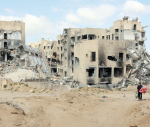You are here
How to fight terrorism
Jan 01,2016 - Last updated at Jan 01,2016
We in this part of the world welcome all efforts geared towards fighting and then eradicating terrorism, exercised by countries from the region and beyond.
While terrorism is primarily ravaging several countries in our region, it is also directly affecting several other countries in the world, including Europe and America.
Fighting terrorism, therefore, is the responsibility of all.
The question is not whether we should fight terrorism or who should fight it, but how it should be fought.
Until now, most countries involved have been fighting terrorism militarily; they have recently been exerting some concerted political effort as well.
The latter, in my opinion, is more important.
Military campaigns against Daesh and other like-minded terrorist groups are essential, taking into account that such groups are occupying parts of some states, establishing governance and causing much damage to individuals as well as countries.
While the military campaigns have not succeeded in ending or even weakening these terrorist groups, they prevented them from expanding and causing more damage.
Seen from this angle, military action is therefore important.
Political action, however, is more important, for it is political inaction that is the main cause of the rise of terrorism.
It is, in fact, in the political vacuum, tension or paralysis that has unfolded since the advent of the Arab Spring in 2011 that these terrorist groups started emerging, surviving and then thriving.
In particular, the political stand-off in Syria between the defenders of the Syrian regime (Iran, Hizbollah, Russia and China) and the supporters of the Syrian opposition (the US, Europe, Turkey and a number of Arab countries) — which till now prevents any political solution from materialising — has created the perfect environment for Daesh and other terrorist groups to grow and flourish.
The same thing can be said about the standoff in Iraq between the Shiites and the Sunnis, which also created the perfect vacuum for Daesh and others to fill.
As long as the standoff on these two fronts prevails, the terrorists will not be fought effectively.
The sad fact is that despite what is said to the contrary, fighting the terrorists does not seem to be either the direct target or the main priority for the major players. And herein lies the main problem.
Look at what is actually happening on the ground.
The direct target for the Assad regime and for its allies is primarily the Syrian opposition — Daesh and other terrorists are at best a secondary target.
Similarly, for the American-led allies, who are supporting the “moderate” Syrian opposition, the more immediate and direct target is the Assad regime — Daesh and other terrorists are also a secondary target.
Worse, the major players on both sides of the divide, who claim that terrorism is their priority, are at odds with each other.
There is a lot of suspicion, competition and even infighting among them.
The recent downing of the Russian jet fighter by Turkey is both a symbol and an epitome of such rivalry and animosity.
How can these “allies” defeat terrorism and eliminate it if terrorism is not their direct target and priority, and if they are too busy playing games and tricks against each other?
So, until the international players in Syria and Iraq come to terms with their differences and make terrorism their direct and common objective, their presumed fight against the terrorists cannot yield the results desired.
Maybe the current political contacts led by the US and Russia, as well as by some active Arab players, could arrive at some agreement among the various parties on who the common enemies and the real terrorists are.
That will make it easier to fight them both militarily and politically.
Until and unless this happens, the terrorists will continue to wreak havoc on our part of the world and elsewhere.














